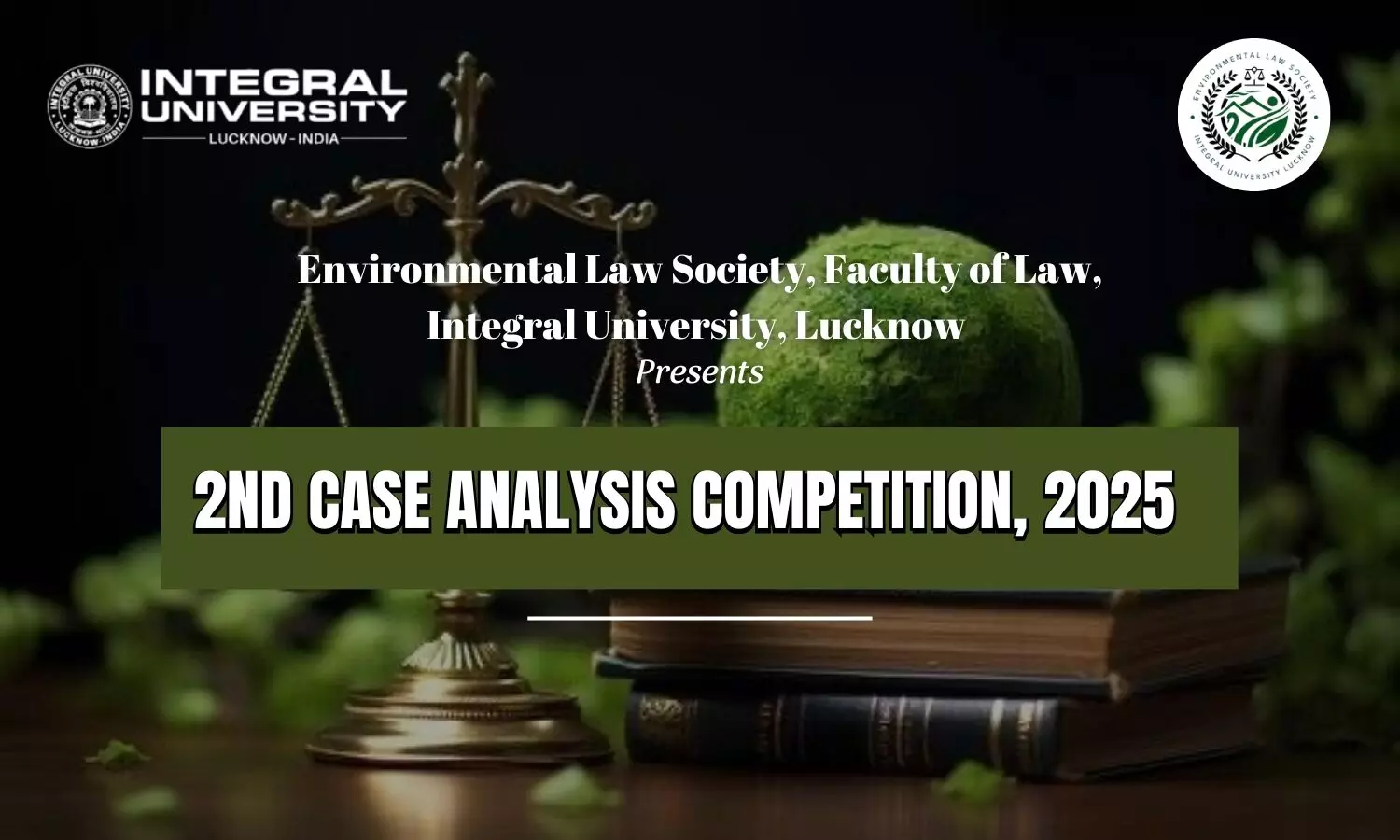2nd Case Analysis Competition 2025 | Faculty of Law, Integral University Lucknow
Faculty of Law, Integral University, Lucknow is organizing its 2nd Case Analysis Competition. Scroll down for more details!

Environmental Law Society, Faculty of Law, Integral University, Lucknow is organizing its 2nd Case Analysis Competition 2025 in an online mode.
About the University
Integral University is located in Lucknow, the capital city of the largest state of India, Uttar Pradesh. It was established under Act Number 9 of 2004 by the State Government. Integral University, the first enacted Minority University in the country, started functioning on 1 April 2004. The University is recognized by the University Grants Commission (UGC) under sections 2(f) and 12B of the UGC Act, 1956, as well as by other regulatory bodies such as the Medical Council of India, Pharmacy Council of India, Indian Nursing Council, Council of Architecture, Bar Council of India, Indian Association of Physiotherapists, National Council for Teacher Education, and UP State Medical Faculty.
About the Faculty of Law
Integral University's Department of Law in Lucknow offers a range of programs, including undergraduate, postgraduate, and Ph.D. Our mission is to educate future legal professionals with knowledge, integrity, and dedication. Our vision is to blend India's legal heritage with a global perspective. Our accomplished faculty is actively involved in legal research. Accredited and successful alumni reflect our program's quality.
About the Society
The Environmental Law Society, Integral University, Lucknow, is a student-run organization for future environmental lawyers and students interested in environmental issues, constituted to instill in students a spirit of environmental responsibility and increasing awareness of each person’s individual obligation to help prevent further environmental degradation.
About the Competition
Case analysis competitions allow students to apply theoretical legal concepts to real-world scenarios. This practical application enhances their understanding of how the law operates in practice. Participants develop strong analytical skills by dissecting complex legal issues, identifying relevant facts, and crafting well-reasoned arguments. Case analysis often requires extensive legal research, helping students improve their ability to find, analyze, and interpret legal sources. Students enhance their legal writing skills by preparing written submissions or memoranda, which is crucial for legal professionals.
Analysis of case laws and judgments on environmental issues helps develop a legal understanding of environmental law. Developing legal acumen in environmental law is of paramount importance as it equips students with the legal tools to address pressing environmental challenges. It also plays a pivotal role in enhancing awareness on environmental conservation and sustainable development in line with the sustainable development goals adopted by the United Nations in 2015.
List of Cases
1. Vellore Citizens Welfare Forum v. Union of India (1996) – Environmental Degradation and Water Pollution
- Citation: AIR 1996 SC 2715
- Link: Vellore Citizens Welfare Forum vs Union Of India & Ors on 28 August, 1996
2. M.C. Mehta v. Union of India (2002) – CNG Vehicle Case
- Citation: AIR 2002 SC 1696
- Link: M.C. Mehta vs Union Of India And Ors on 5 April, 2002
3. Church of God (Full Gospel) in India v. K.K.R. Majestic Colony Welfare Association (2000) – Noise Pollution Case
- Citation: AIR 2000 SC 2773
- Link: Church Of God (Full Gospel) In India vs K.K.R. Majestic Colony Welfare ... on 30 August, 2000
4. Narmada Bachao Andolan v. Union of India & Others (2000) – Sardar Sarovar Dam Case
- Citation: AIR 2000 SC 3751
- Link: Narmada Bachao Andolan vs Union Of India And Others on 18 October, 2000
5. M.C. Mehta v. Union of India (1996) – Taj Trapezium Case
- Citation: AIR 1997 SC 734
- Link: M.C. Mehta vs Union Of India & Ors on 30 December, 1996
Language
The preferred language for the same is English only.
Mode
Online
Eligibility
The competition is open to law students, both undergraduate and postgraduate, who are currently enrolled in any recognized institution or university across India.
Submission Guidelines
- Participants must submit a verified copy of their student Identity Card or a bona fide certificate along with their entry for verification purposes.
- All case analyses must be written in English and submitted in Microsoft Word format (.doc/.docx). Submissions in other languages or formats will not be considered.
- Each participant is allowed to submit only one entry. Co-authorship is permitted, with a maximum of two authors per entry.
- All submissions must include a cover page with the author’s name, institutional affiliation, course, year of study, email address, and contact number.
- The main text of the case analysis must be free from any identifying information. Any violation of this rule will lead to immediate disqualification.
- The analysis must be an original and unpublished work, not under review or submitted to any other publication or competition.
- Plagiarism in any form will result in immediate disqualification from the competition.
- Any Manuscript beyond 10% Plagiarism shall be disqualified.
- The recommended word limit for the case analysis is between 2000 and 3000 words, including citations.
- All entries must be submitted by 11:59 PM on 23rd February 2025.
- Participants must submit a case analysis on one of the provided cases related to environmental law.
Formatting Guidelines
- The submission should be typed in Times New Roman, Font Size 12, with 1.5 line spacing, and justified alignment.
- Footnotes must be typed in Times New Roman, Font Size 10, with 1 line spacing.
- The document should have 1 inch or 2.54 cm margins on all sides.
- All citations must adhere to the Harvard Bluebook, 20th Edition.
Submission Guidelines
- No hardcopy submissions are required.
- All submissions must be submitted to the following google form.
Submission Link: [Click here to Submit]
Evaluation Criteria
The submissions will be evaluated based on the following criteria:
- Comprehension of the underlying essence of the case.
- Research quality in terms of relevant precedents found and cited.
- Writing proficiency, including content quality, logical sequencing, legal reasoning, innovative ideas, language, and grammar.
- The decision of the judges and organising committee with regard to the event shall be final.
Awards
- Winner: Trophy + Certificate of Merit
- 1st Runner-Up: Trophy + Certificate
- 2nd Runner-Up: Trophy + Certificate
- 4th and 5th Position Holders: Publication of the case comment in the Legal Quorum Journal
- E-Certificate: Provided to all participants.
Registration Link
Registration Fee
- Single Author: Rs. 150
- Co-Author: Rs.200
Important Dates
- Registration Ends: 18th February 2025
- Submission Deadline: 23rd February 2025
- Announcement of Results: 1st March 2025
Payment Details
- Bank Account Holder Name: Khubaib Rehman
- Bank Name: HDFC Bank
- Account Number: 50100480183065
- IFSC Code: HDFC0000945
UPI ID: khubaibrehman51@okhdfcbank
Google Pay Number:
Note: A screenshot of the payment must be attached in the Google Form for successful registration.
Downloads
Brochure: [Click here to view]
Contact
Email: [email protected].
Mridul Mishra (Convener) - +91 93056 62950
Areesha Aafreen (Co-Convener) - +91 88817 45668
Khubaib Rehman (Secretary) - +91 76519 24369
Mariya Firdaus (Member) - +91 63882 35567
Hassan Sarwar (Member) - +91 74580 09142


